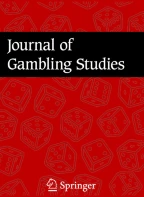Abstract
Superstitious beliefs, defined as a strong conviction based on the erroneous perception of a cause-effect association between two independent events, are considered to play an instrumental role in the maintenance of gambling behaviour. In this preliminary study, responses to eight items assessing superstitious beliefs were compared among 56 electronic gaming machine (EGM) problem gamblers, 22 non-problem EGM and 23 non-EGM non-problem gamblers. Results suggested that problem gamblers endorsed more superstitious beliefs than non-problem gamblers and that such beliefs were correlated with gambling intensity. Further research is required to determine if superstitious beliefs represent a vulnerability factor for the development of problem gambling or emerge as a consequence of involvement in gambling.
Similar content being viewed by others
REFERENCES
Gaboury, A., & Ladouceur, R. (1989). Erroneous perceptions and gambling. Journal of Social Behavior and Personality, 4, 411-420.
Griffiths, M.D. (1993). Pathological gambling: possible treatment using an audio playback technique. Journal of Gambling Studies, 9, 295-310.
Henslin, J. (1967). Craps and magic. American Journal of Sociology, 73, 316-330.
Joukhador, J., Maccallum, F. & Blaszczynski, A. (2003). Differences in cognitive distortions between problem and social gamblers. Psychological Reports, 92, 1203-1214.
King, J.M. (1990). Neutralizing Marginally Deviant Behaviour: Bingo Players and superstition. Journal of Gambling Studies, 6, 43-60.
Ladouceur, R., Gaboury, A., Bujold, A., Lachance, N., & Tremblay, S. (1991). Ecological validity of laboratory studies of video poker gambling. Journal of Gambling Studies, 7, 109-116.
Ladouceur, R., & Walker, M. (1996). A cognitive perspective on gambling. In P. M. Salkovskis (Ed.), Trends in Cognitive and Behavioural Therapies (pp. 89-120). New York: John Wiley & Sons.
Langer, E. J. (1975). The illusion of control. Journal of Personality and Social Psychology, 32, 311-328.
Lesieur, H. R., & Blume, B. (1987).The South Oaks Gambling Screen (SOGS): a new instrument for the identification of pathological gamblers. American Journal of Psychiatry, 144, 1184-1188.
Ninness, H.A.C, & Ninness, S.K. (1998). Superstitious math performance: interactions between rules and scheduled contingencies. The Psychological Record, 48(1), 45-62.
Productivity Commission (1999). Australia's Gambling Industries: draft report. Canberra: Productivity Commission.
Reber, A.S. (1985). Penguin Dictionary of Psychology. London: Penguin.
Rogers, P. (1998). The cognitive psychology of lottery gambling: a theoretical review. Journal of Gambling Studies, 14, 111-133.
Sharpe, L., & Tarrier, N. (1993). Towards a cognitive behavioural theory of problem gambling. British Journal of Psychiatry, 162, 407-412.
Sylvain, C., Ladouceur, R., & Boisvert, J-M. (1997). Cognitive and behavioural treatment of pathological gambling: a controlled study. Journal of Clinical and Consulting Psychology, 65, 727-732.
Toneatto, T. (1999). Cognitive psychopathology of problem gambling. Substance Use and Misuse, 34, 1593-1604.
Toneatto, T., Blitz-Miller, T., Calderwood, K., Dragonetti, R., & Tsanos, A. (1997). Cognitive distortion in heavy gambling. Journal of Gambling Studies, 13, 253-266.
Walker, M. B. (1992). Irrational thinking among slot machine players. Journal of Gambling Studies, 8, 245-261.
Author information
Authors and Affiliations
Corresponding author
Rights and permissions
About this article
Cite this article
Joukhador, J., Blaszczynski, A. & Maccallum, F. Superstitious Beliefs in Gambling Among Problem and Non-Problem Gamblers: Preliminary Data. J Gambl Stud 20, 171–180 (2004). https://doi.org/10.1023/B:JOGS.0000022308.27774.2b
Issue Date:
DOI: https://doi.org/10.1023/B:JOGS.0000022308.27774.2b
